Carl's God of War Tips
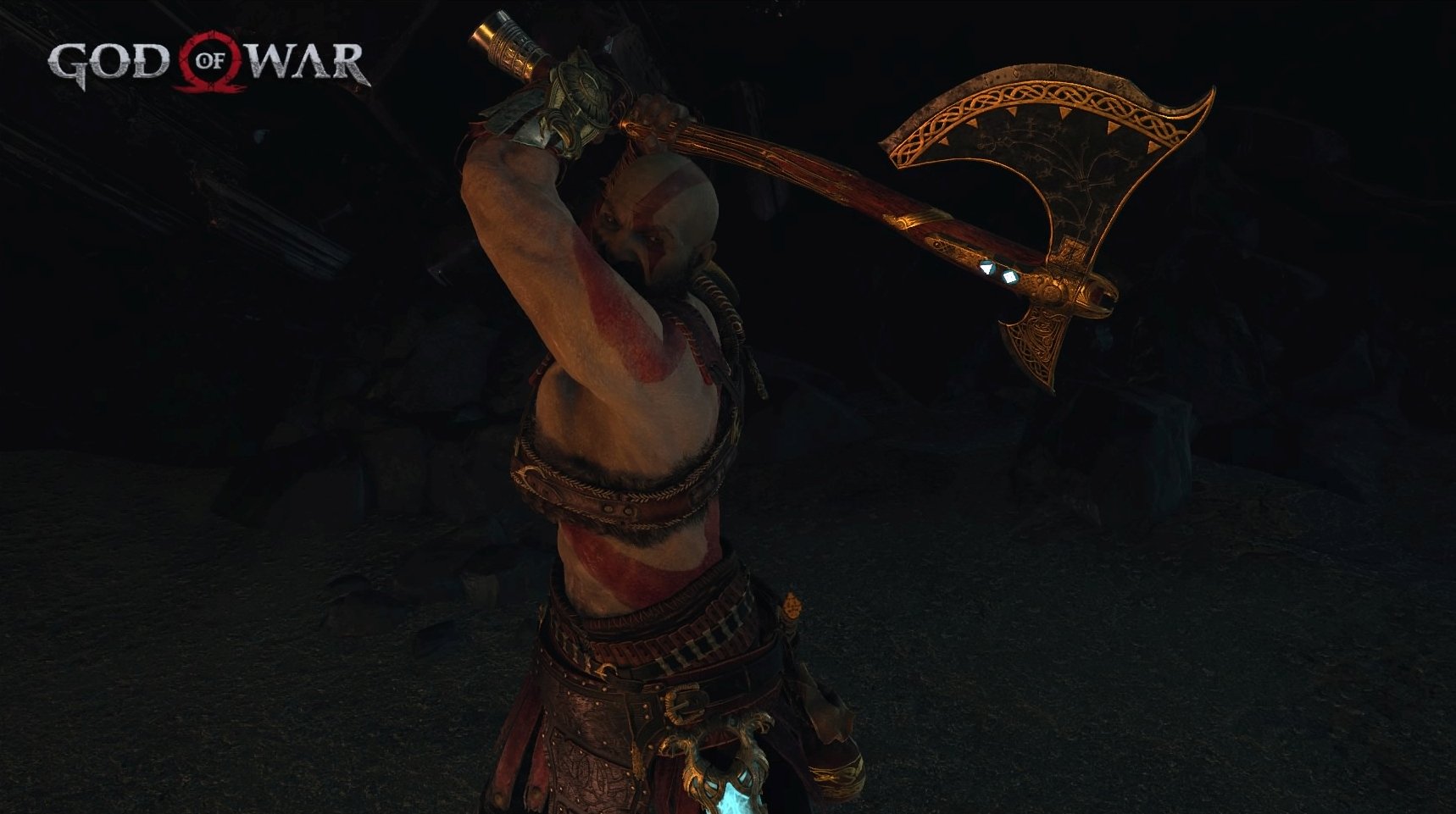
Writing a guide to God of War will take me several months. For now I only have a lot of notes and ideas for what this will one day become. In order to better help people who find themselves on the main page but find the content thin, I've chosen to begin with tips that help newcomers with God of War's combat and other gameplay systems. You can expect light spoilers about what is in the game (its fast travel system, shops, and abilities Kratos and Atreus unlock) but I will not directly touch upon the God of War story at all. I hate spoilers and will attempt to avoid them. Everything in this site will be hidden behind the navigation menu, so don't go looking about if certain types of spoilers bother you. I'll attempt to keep things sectioned off in that way out of respect for my fellow GoW players.
Latest Guides:
Atreus Guide - New
Stats: Luck, Strength, Cooldown, Defense, Runic and Vitality - New
Stats Tips for Making a Build - New
Status Effects such as Permafrost - New
Gameplay Tips and Combat Help
I've broken this into sections so that you can skim past things you already know.
Difficulty
God of War includes four difficulty settings: Give me a Story, Give me a Balanced Experience, Give me a Challenge, and Give me God of War. So long as you do not select God of War difficulty you can raise or lower the difficulty at any time through the game's settings menu - change it by going to the character screen and pressing triangle. I recommend most players at least begin on 'Give me a Balanced Experience' and lowering it to 'Give me a Story' if they find they just can't learn. God of War autosaves often, so you'll never need to redo a chunk of the game over a death. Balanced gives enemies nor Kratos any bonuses, while Give me a Story upsets the power curve greatly in favor of the player (especially with an upgraded Kratos). Give me a Challenge gives enemies bonuses and is good for experienced players, especially those who have played Dark Souls. Give Me God of War is far more than a power boost to enemies but also introduces new mechanics that will be covered later. Do not expect the typical ramp in enemy stats you get from most higher difficulty settings in games.
Blocking vs Parrying and Enemy Attacks
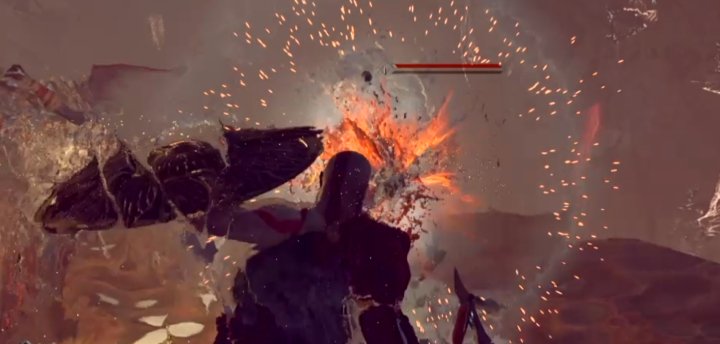
Attacks that flash neither yellow nor red can be blocked with your shield. Blocking at the last second counts as a parry and will put the enemy on the defensive. With Guardian Shield skills you unlock, you can capitalize on a parry with a powerful counter. Until you get these, you can follow up with a combo.
Enemy attacks that flash yellow can break your block and stagger Kratos. However, if you push block at the last second you can parry these attacks. Regular (non-flashing) attacks can be parried as well though the visual cue is certainly more subtle and timing it is based on the type of attack the enemy is using. Attacks that flash red can neither be parried nor blocked, so you should use dodge (double tap x with a direction held) in order to avoid them. I believe blocking may slightly reduce the damage of red attacks but there's no reason to do this - you can outright avoid it if you have time to get the shield up.
Learning to block attacks is important, but learning to parry is crucial for surviving harder difficulties because of the powerful follow up attack and the fact that Kratos is invincible while in this animation. This is particularly important early in the game when you don't have so many flashy abilities and runic attacks.
Stun Meter and Finishers
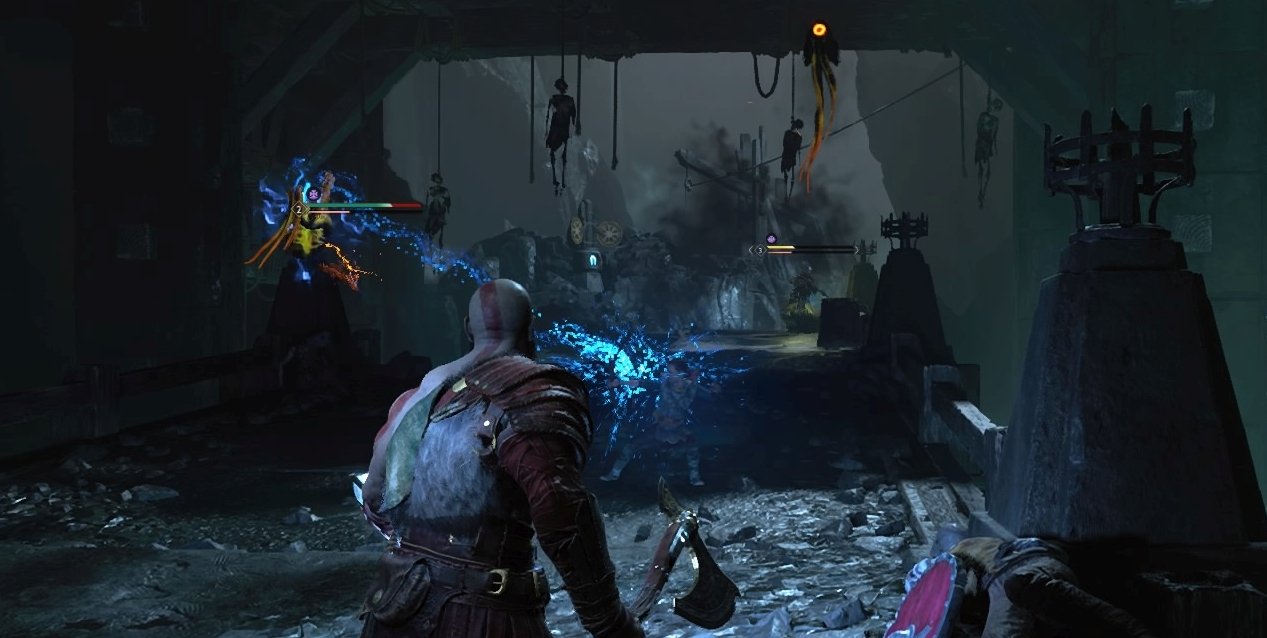
Enemies being hit gradually take stun damage, much more from bare-handed attacks and Atreus' attacks. This is represented by a stun meter just under their health bar. Fill the bar up before the enemy can recover and you'll be able to execute a finisher with R3. Kratos is invincible while executing a finisher, though not all of them really 'finish' an enemy, but may simply take off a large chunk of health. Sometimes you are in control of where you throw an enemy or cause an ogre to smash its massive fists. This can allow you to deal extra damage by hurling a Draugr at its friend or tossing him off a cliff.
Upgrade Atreus Early
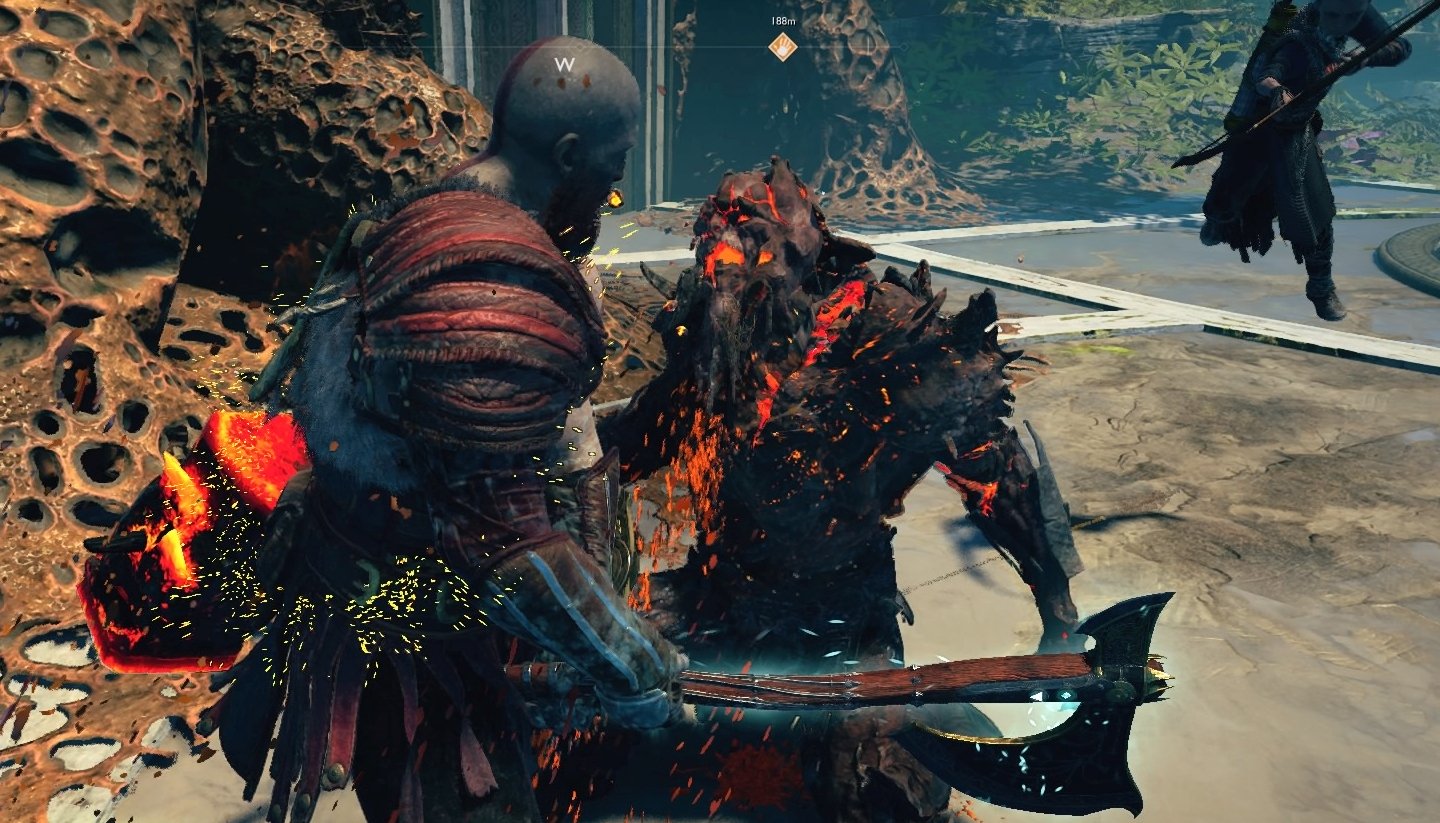
The Teamwork and Ferocity abilities are both key to making Atreus more useful in combat. Teamwork is especially useful on higher difficulties as when you're facing multiple monsters, he can occasionally lock down one of them and give you an opening. With the right upgrades to armor, he can even expose a weakness and boost damage you deal. Ferocity will make him more active and increase the damage and stun damage he deals.
Guardian Shield - Block Break, Countering Strike and Guardian Sweep
There are a few other great early abilities. As you progress you'll begin to face more enemies with shields, and being able to break their block is important. Take the cheap block break upgrade (double tap L1) to give yourself an opening when an enemy has their shield raised. You should also get the Countering Strike to get full functionality from a parry. Lastly, the Guardian Sweep ability is OP for monsters that are durable against the Leviathan Axe but vulnerable to stun.
Fire Away!
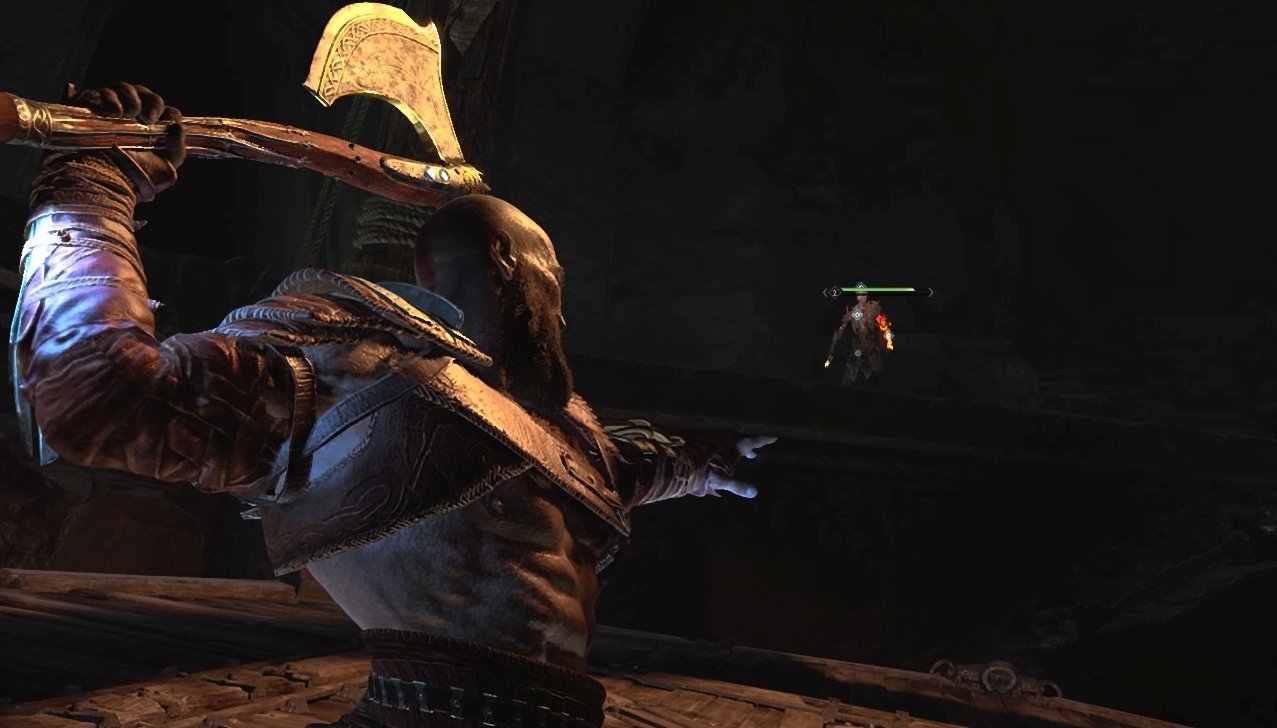
Ranged attacks are your best friend in God of War. Fighting a Revenant and hate how they dodge you? Fire with Atreus as you approach to stagger them slightly and give yourself an opening. Use the leviathan axe to start fights. Aim for the feet to trip one monster and separate him from the crowd approaching you. You can hammer square while you swing with R1 to up your DPS. Atreus' arrows are usable even during your own combos, so make use of them. You can target specific spots by aiming with the leviathan axe and pressing square to make Atreus fire there, or simply do so without aiming to have him fire at whatever is closest to the center of your screen. He will target enemies without you needing to look, but it can be handy to deal with something annoying like a nightmare or the aforementioned Revenants.
You can use L2 along with the target lock system (R3) to help you aim. When you press R2 with a lock on, Kratos will automatically face toward the target. This allows you to throw a bit faster (less turning) and is repeatable if the enemy moves. This won't hit weak points but you can manually adjust the angle of the throw.
Aggro is a Thing in God of War
While not nearly as complex as an MMO's aggro system, God of War does let Atreus steal Aggro from you. Since you're the one that can be killed, it makes sense to have Atreus peel enemies off you with a little fire from his talon bow. This can help immensely when you need to kite a higher-leveled enemy that is kicking your ass. I've cheesed a few fights this way. It doesn't work so well on bosses but on a heavy draugr with an equally-powerful friend and a level 2 Kratos, it works wonderfully.
Level Up!
Kratos' level is determined by the level of all his gear combined. As you level, your gear with have more slots and as you progress through the game you will find higher level enchantments. More slots, thus more high-level enchantments, means a higher level for the big guy. Stats increase as gear levels along with slot count. The stats you choose along with gear and perks determine your build, but you have more reason to raise levels than pick stats you like: your relation to the enemy's level matters more than 10 more strength or runic. Read on.
Enemy Levels & Kratos - Why Stats are Not King
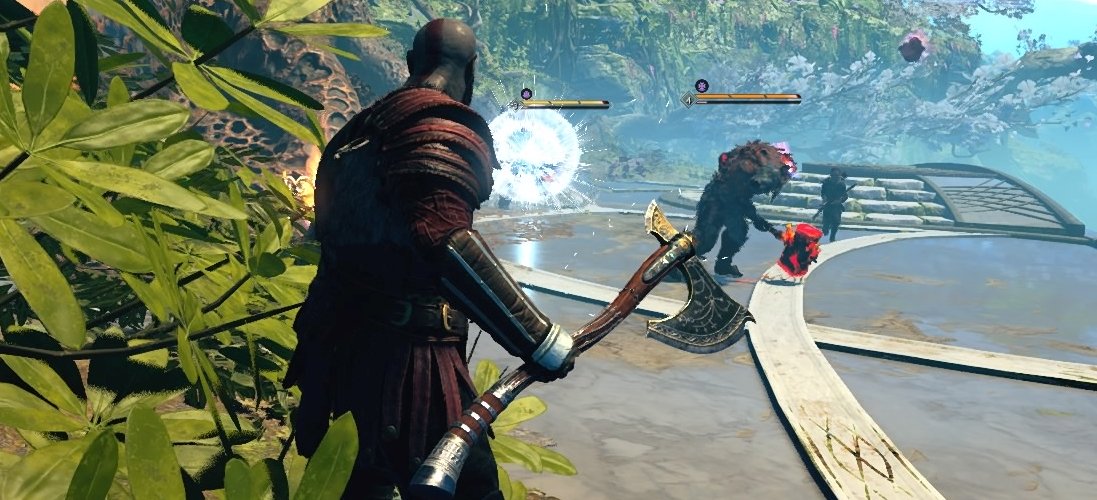
Enemies at or below your level will have a green or light green health bar. Enemies one level above have yellow health bars, then orange for +2. Any higher and the enemy will have a purple health bar, and purple with a skull when even further. An enemy having even one level advantage over you leads to them dealing increased damage and having more health or defense (hard to tell which). Due to this, and just how badly they can pummel you with a +3 level advantage (one shot kills sometimes) you need to raise Kratos' level if you want to do certain side quests and things like rift tears earlier in the game.
Even one level makes a huge difference. So, since you will not deal like 20% extra damage from having more strength from that lower leveled chest plate you like, you're better off to gain the extra level if gear you've found will do it. Worry only about this when you're close to another whole level. If you're 3 and 1/2 you can afford to mess around with your stats and build Kratos as you see fit, but at 3.9 you'd be better off to get boosted to 4. So, as a general rule, I'll only use something I don't like if it will take me to the next whole level. This isn't a hindrance, as there is plenty of good gear to be found and I'm sure to find something I like or that I can live with.
Making Money (Hacksilver) and Experience: The Luck Stat
Luck doesn't appear all that often on gear but can be found on enchantments you place on your armor. Its role in the early game is not to directly boost you, but rather indirectly. Luck increases XP and Hacksilver gains, giving you the opportunity to craft and upgrade more gear or purchase boosts to Atreus and Kratos. This in turn makes your character more powerful. To a fully leveled character with all skills, the Luck Stat is far from useless though it may take a back seat to more important stats like Runic and Strength. Luck increases the rate at which procs on axe pommels and enchantments fire (and maybe Atreus finding health stones with the recovery armor). You don't have many of these early game so it's nice the devs gave this extra use for Luck.
Sell Artifacts
There is literally no reason to keep the artifacts you find. The game even says they serve no other purpose, so sell away. God of War will keep track of the artifacts you've found within a set and reward you appropriately if you complete said set. You can make the extra hacksilver you need for another upgrade this way, so don't hinder yourself.
Sell Equipment
It is also safe to sell older equipment, even if you're not sure if you'll need it again (you likely won't). You can buy back anything you sell, as far as I can tell. Since each item is crafted only one time, the developers threw in a way for you to get those items back without crafting them again. What is more, I think you pay the sell price to recover them, like some kind of loan.
Check Lost Items
Brok and Sindri's shops have a 'Lost Items' tab. This is for when you knock an enemy off a cliff or into some rocks and you can't pick up important materials that are limited in quantity. Check it every time you've completed some big battles and return to a shop. I've had this happen with Travelers a few times, but each time the traveler loot was there in the Lost Items tab. I saw someone even missed a Frozen Flame required to upgrade the Leviathan Axe. The fact that you are given exactly enough materials to max out Kratos' weapons and could fail to pick one up is probably why this tab even exists, but it helps with things like Soft, Solid, and Hardened Svartalfheim Steel that drop more frequently are not nearly as essential.
Explore and Explore Some More
God of War is an amazing game and I suggest you savor the experience and not rush through The Journey. You're also better off gear and level-wise if you do so, and this may be particularly important the higher the difficulty you've chosen for your gameplay. A minor spoiler is that the Lake of Nine changes each time you complete a major part of The Journey. More areas will open, allowing you to access areas previously inaccessible. When you first come out of The River Pass, there are already a few places to go and you'll be rewarded with upgrades, Runic Attacks, Hacksilver, and crafting materials for your efforts. When you complete the next major phase, you can do even more. Some of the best mid-game armor is to be found from side-quests you get from the dwarves and spirits around the lake. You'll also struggle less making decisions when you can only afford one upgrade at a dwarven shop. Do the quests, enjoy the dialog, the lore and developing relationship between Atreus and Kratos. That's the best advice I can give.
Other Stuff
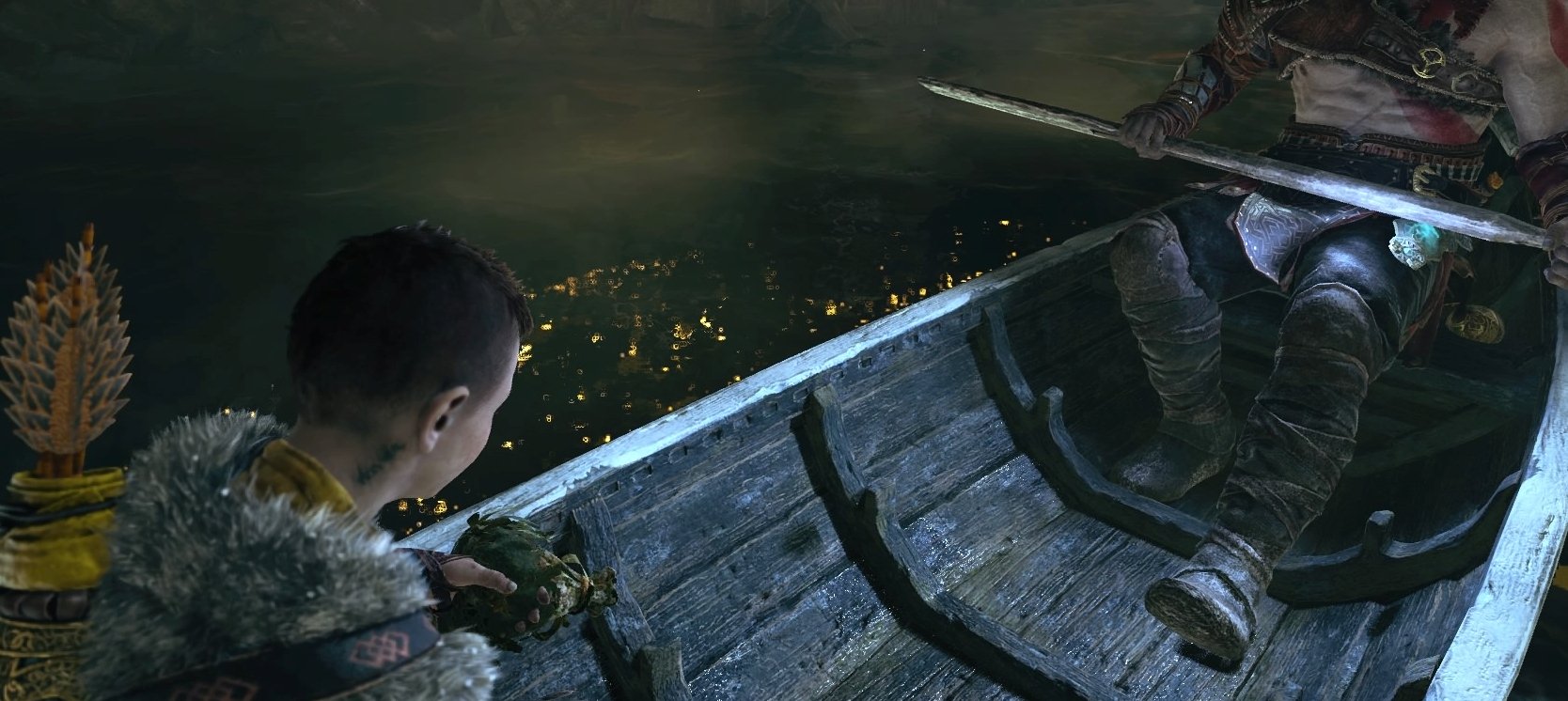
- Watch for Aegir's Gold (pictured) while you're rowing in streams or the Lake of Nine, particularly mid-game as more appears with time. You can also crash into floating barrels with the canoe to get Hacksilver.
- Gateways heal you, whether you travel or not. Interact with them to be healed to full.
- Make backup saves by going to the character screen and pressing triangle (this is also where you can change the game difficulty). You can save up to 8x (a limitation which annoys the hell out of me trying to make a guide). You may wish to do this occasionally just to be safe.
- Fast Travel is a loading screen. You can chill and listen to the dialog then walk to the white gate which will appear when it is done loading.
Other God of War Guides
God of War Stats: What Luck, Cooldown, Strength, Defense and Runic do for Kratos
Using Stats to Make a Build
Atreus in Early to Mid Game - Making use of Atreus and upgrading his abilities.
Status Effects - Permafrost, Immolation, Shock, etc.
Niflheim (End Game Content) - Increase Mist Resistance.
